After 30 years, the internal government documents from 1984 have been released to the public.
In 1984, the Fine Gael and Labour coalition, led by taoiseach Garret FitzGerald and tánaiste Dick Spring, entered its third year.
It was a time of severe economic crisis – as could be seen by the demise of Irish Shipping.
There was also some new thinking in evidence – the government’s plan for a new National Lottery signalled the end of the controversial Irish Hospital Sweepstakes, which had raised millions of pounds for Irish hospitals over the years, but had also seen tickets being sold abroad, in contravention of foreign law.
Above all, 1984 saw the continued push for a new Anglo-Irish Agreement, which would give the government a right of consultation in Northern Ireland.
This was deemed by FitzGerald to be a top priority, as he felt it was the only way to reverse nationalist alienation and stop the electoral rise of Sinn Féin.
Part of the process was the report of the New Ireland Forum, representing all the constitutional nationalist parties.
This outlined various options for the future of the island – unity, federation, joint sovereignty - but the real meat as far as FitzGerald was concerned was in its talk of requirements for a solution, which he believed could eventually lead to a solution acceptable to Unionists.
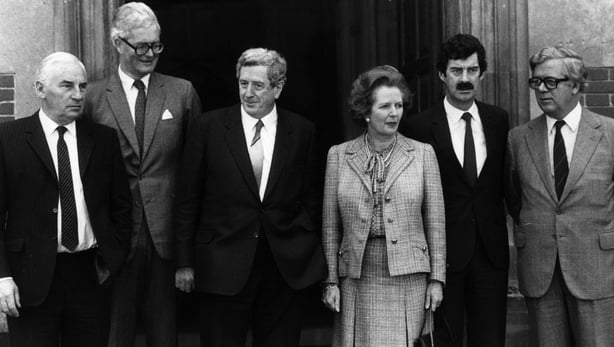
He faced an enormously difficult task in persuading British prime minister Margaret Thatcher to play along, as can be seen by her belligerent performance at a summit in Chequers in November.
Though she seemed to come round a bit by the end of the meeting, her performance at a subsequent news conference outraged nationalist Ireland.
She casually dismissed the three options outlined in the New Ireland Forum Report.
Although FitzGerald didn’t think they were the way forward either, he gloomily acknowledged in a note to officials that “the Northern Ireland situation has been significantly changed by the Thatcher Press Conference”.
The Irish side of the story is being released a full year after the British documents from 1984 were made public.
That is because Britain is gradually moving from a 30-year access rule to 20 years.
So on 30 December, the British papers from 1985 and 1986 are to be released (at least in theory – many of the files from 1986 have been “temporarily retained”, apparently because they have yet to be cleared for release).
Clearly, if a balanced picture of our recent history is be achieved, some thought will have to be given to whether we should follow Britain towards a 20-year access period.
The documents from 1984 can be viewed in the National Archives, in Bishop Street, Dublin 8, by anyone with a valid reader’s ticket, which can be obtained at the Archives.
There are more details, as well as many links to documents, on their website at http://www.nationalarchives.ie/
SHIPPING
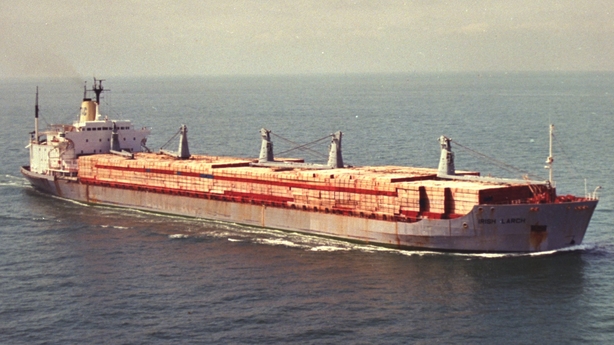
Irish Shipping Vessel 'Irish Larch', 1985 (RTÉ Stills Library)
The start of 1984 saw Irish Shipping in serious difficulty, with communications minister Jim Mitchell looking for extra money – 24 million pounds in extra borrowing for the company, to be exact.
Finance minister Alan Dukes was predictably unimpressed, saying the extra cash wouldn’t guarantee the company’s future – but in February, the Government agreed to give the money.
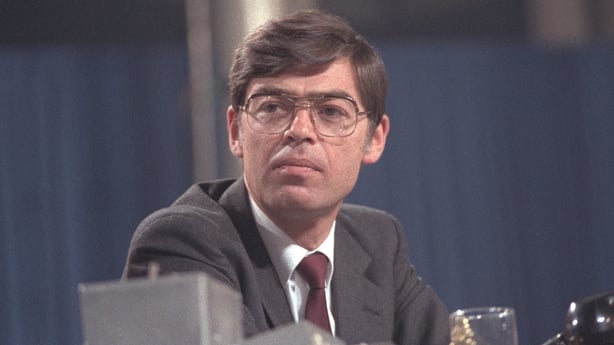
Alan Dukes at the Fine Gael Ard Fheis in 1984 (RTÉ Stills Library)
But Dukes was right – costs rose, earnings dropped, and the company quickly got into further difficulty.
By October Jim Mitchell was recommending putting Irish Shipping into liquidation – but not before a furious row with Dukes.
Mitchell said he was worried that a liquidation would damage Ireland’s credit rating, and make it more difficult for the government, and for other semi-State companies, to borrow money internationally.
Dukes said it wouldn’t – and in a memorandum to government, Mitchell accepted this – “provided that the Minister for Finance’s assessment… is confirmed by independent advice”.
Dukes exploded, replying that the condition attached by Mitchell carried “the innuendo that I have a personal interest in the advice I may offer to Government… it also represents a totally unwarranted and objectionable questioning of my authority and competence”.
He complained to Garret FitzGerald that he found Mitchell’s suggestion “deeply offensive” and “quite intolerable”.
Whatever about the minister for finance’s feelings, the company was doomed – and in mid-November, a liquidator was appointed.
EXPENSES
The economic situation remained grim in 1984, and the Department of Finance was keen to curtail spending wherever possible. In particular, it wanted to cut down on the cost of State entertainment.
It claimed that the number of public servants attending State entertainments “continues to be generally excessive and stricter controls in this area must be exercised”.
Finance also wanted departments to keep within the approved spending per head at these events. “With due economy, particularly in drink consumption, these limits are more than adequate.”
It seems these words fell on deaf ears, particularly in the Department of the Taoiseach.
A dinner for the SDLP in September cost £1,043 – or £423 over the limit; lunch for the Alliance party in August cost £1,171 – or £751 over the limit; while a dinner for the Spanish prime minister in September cost £5,920 – an eye-watering £2,200 over the limit imposed by the Department of Finance!
LOTTO
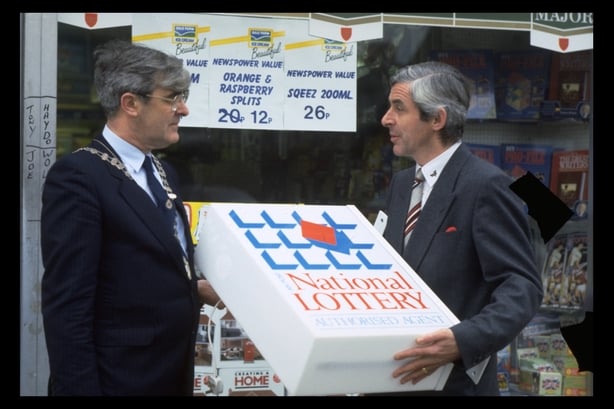
J Fitzpatrick presents a National Lottery sign to newsagent Arthur Daggen in 1987 (RTÉ Stills Library)
The Irish Sweeps was a privately-owned lottery, which raised money for hospitals.
By 1984, the company was in serious financial difficulty; owner Paddy McGrath claimed his family had lost five million pounds over the previous decade, while the State had taken in 25 million pounds.
Another problem was a State plan to set up a national lottery.
In April 1984, McGrath offered Taoiseach FitzGerald a deal – in return for the State buying out the lease on the Sweeps property in Ballsbridge for £1.7m, he would set up the new National Lottery and train his existing staff to run it.
FitzGerald was keen, telling the Cabinet the proposal was “a very attractive one”.
But the plan was derailed. Despite the Taoiseach’s insistence that a decision should be made quickly, discussion on it disappeared into an inter-departmental committee.
A month later he angrily asked what was happening with McGrath’s proposal, adding “it would be unforgiveable if it were to have been let slip through our fingers”.
But health minister Barry Desmond was opposed – pointing out that the Ballsbridge site was actually owned by the State, and that the Sweeps had a “quite exceptionally generous” lease on it.
He wanted a completely independent National Lottery established, pointing out that the Ballsbridge site would then revert to the State at no cost.
It appears that at this point McGrath overplayed his hand, demanding an extra 1.5m pounds from the government to pay off his staff.
In 1986, An Post won the contract to run the Lottery – and that was the end of the Sweeps.
Ronald Reagan
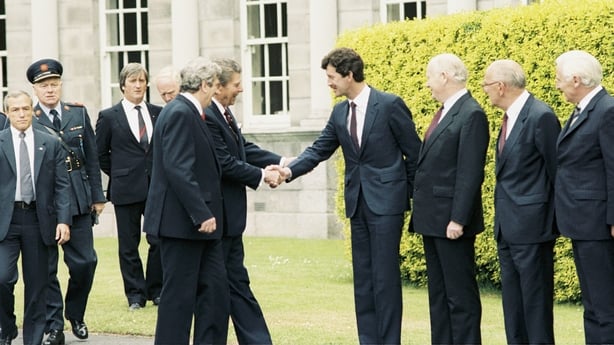
Garret FitzGerald introduces Ronald Reagan to Dick Spring (RTÉ Stills Library)
US president Ronald Reagan’s visit to Ireland in June 1984 was a major international story – and one that played well to Irish-American audiences, especially with Mr Reagan facing re-election the following November.
With an eye on how the visit would be viewed back home, the White House wanted TV cameras at the State dinner, and hoped that “good Irish entertainment” would be provided.
In his speech at the State dinner, the taoiseach was mildly critical of US policy in Latin America – but in a private meeting with the president in Government Buildings before hand, the official record shows he was more circumspect.
He offered help through fellow Christian Democrat parties in getting talks going, while tánaiste Dick Spring offered similar help through the Socialist International.
FitzGerald also warned the president of possible interruptions to his Dáil speech from the two Workers Party TDs, adding that “he would be escorting him down the steps in a particular way… passing these two representatives”, presumably to prevent any interference.
The taoiseach said the two TDs seemed to be “genuinely communist in conviction” and might be getting financial support from the USSR
The Americans also looked for assurances that technology produced in Ireland wasn’t exported to the Soviet Union.
FitzGerald assured them that Irish controls on exports were even stricter than the ones imposed by NATO countries.
One Irish export, though, did go down well with the Soviets in 1984 – RTÉ drama Strumpet City was shown on prime time Russian television. T
he Irish Embassy in Moscow reported that it was seen as portraying “the struggle of Irish workers for their rights at the beginning of the 20th Century”, and demonstrated the need “to find in oneself courage to stand in the ranks of the strikers who threw down a challenge to the capitalist magnates and their underlings”.
WATER
Charging directly for water may be controversial nowadays, but in the 1980s the then government had a different idea – selling water to Saudi Arabia and the Gulf States.
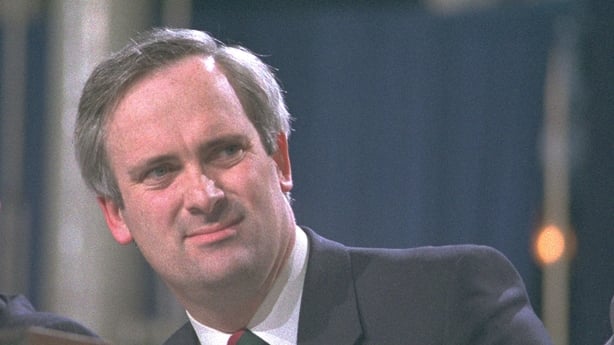
John Bruton at the Fine Gael Ard Fheis in 1984 (RTÉ Stills Library)
Industry minister John Bruton discussed the idea with the Saudis during a visit in February 1983, proposing that water for irrigation could be sent on oil tankers returning home after delivering oil to Ireland.
The Irish National Petroleum Corporation then came up with what it thought was an even better plan – sending the Saudis drinking water, at five dollars a barrel – at a time when oil was costing about thirty dollars a barrel.
Once production got fully under way, the Corporation hoped to be able to deliver up to one million barrels of drinking water a day.
Unfortunately, the Saudis and Gulf states showed no interest, saying they had enough underground water to meet their needs.
OUT, OUT, OUT
1984 saw difficulties in cross-border security co-operation, with garda commissioner Laurence Wren and RUC Chief Constable Jack Hermon not on speaking terms.
One of the most dramatic episodes was the arrest and extradition from the Republic of the INLA’s Dominick McGlinchey, though Dublin had to protest at reports that he was being questioned about other crimes in contravention of an agreement with the British.
In August, the British ambassador, Alan Goodison, accused Dublin of “complaining at the drop of a hat about the smallest incidents”, such as British soldiers crossing the border by a few feet – as Goodison pointed out, “the soldiers concerned were not always the most intelligent members of society”.

This was the context for November’s summit in Chequers between taoiseach Garret FitzGerald and prime minister Margaret Thatcher. An official noted that both “spoke rapidly and vigorously” and that “the tone of the meeting was at times particularly robust”.
Thatcher offered consultation on security matters; FitzGerald insisted this wasn’t enough, calling for a role for Dublin in decision making.
Thatcher said joint authority or anything like it was totally out because of Unionist opposition, saying “That would put us well on the way to civil war.”
FitzGerald said if constitutional nationalism got nowhere, “Sinn Féin will take over... as the legitimate voice of nationalist Ireland”.
Thatcher suggested redrawing the border, observing that the Scottish-Irish or the Irish-Irish don’t like to move within Ireland, adding: “However, they all seem to be terribly happy to move to Britain…”
Later, in a wider meeting, Thatcher was described as speaking “threateningly” to Peter Barry, the minister for foreign affairs; criticised her own cabinet secretary, Robert Armstrong; and pointed an accusing finger at Irish civil servant Dermot Nally.
But she finished on a conciliatory note, telling the taoiseach: “We like you. We want to deal with you and not with that other man…” a reference to Fianna Fáil leader Charles Haughey.
But that note of goodwill didn’t last long, as at a subsequent press conference she dismissed out of hand the three options produced by the New Ireland Forum for the future of the island – a united Ireland, joint sovereignty, or a federal arrangement.
Her private secretary later told the Irish ambassador that she might be prepared to do something to make amends – but “of course she doesn't like to appear contrite or be seen to apologise publicly in some way.”
Garret FitzGerald also discussed Thatcher with US secretary of state George Shultz during a visit to Washington in March 1984. Asked about his relationship with the British prime minister, the taoiseach said “they were a lot better than most people could guess”.
Shultz observed, quoting the American experience during the Falklands Crisis: “She can get mad at you, even if you're helping.”
DISCRIMINATION
The newly released government files show there was a long-running internal debate about whether discrimination on the grounds of sexual orientation should be outlawed.
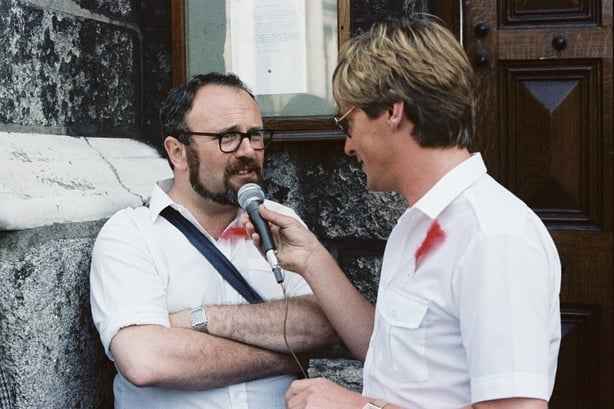
David Norris is interviewed by Pat Kenny in 1983 (RTÉ Stills Library)
The debate began in December 1976, when David Norris, then chair of the Irish Gay Rights Movement, wrote to the then minister for labour, Michael O’Leary. Noting the minister’s moves to outlaw discrimination against women, Norris drew the minister’s attention to the fact that many countries also outlaw discrimination on grounds of sexual orientation.
However, a civil servant within the department noted that “the homosexual is, legally, a criminal under the law of this country and it would not, therefore, be possible to enact legislation which would remove discrimination in relation to employment on grounds of sexual orientation”.
In 1982, following a recommendation by the Parliamentary Assembly of the Council of Europe, another official, L. Collins, said the council presumably felt there was or could be discrimination in employment on the basis of “known homosexual proclivities. It is equally valid to observe that what could appear to be discriminatory could be in fact the protection of young persons against the influence of known homosexuals in particular roles, i.e. training, advisory placement etc..."
In 1983, as discussion within the department continued, another official, D Horan, noted that public opinion was not sympathetic towards homosexuality.
“I feel that there are no signs that society is ready to change this attitude. It is difficult to imagine parents accepting that a known homosexual should be allowed to take charge of a class of young boys on the grounds that it would be unlawful to object...”
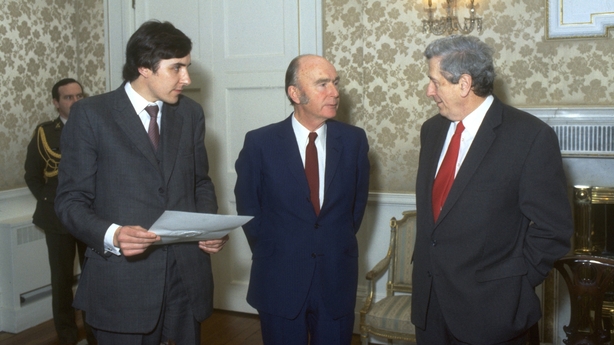
Attorney General John Rogers, President Patrick Hillery and Garret FitzGerald in 1984 (RTÉ Stills Library)
In November 1986, Attorney General John Rogers wrote to the then minister for labour Ruairí Quinn, who had sought legal advice on the issue.
Rogers wrote: “I do not think the fact that certain homosexual practices are criminal offences means that discrimination against a person on grounds of sexual orientation by an employer cannot be made unlawful.
“The mere fact that a man has a homosexual orientation does not make him guilty of any criminal offence... I have no doubt that legislation in this area would be highly controversial; that, however, is a political and not a legal question.
“If, however, legislation were for reasons of policy to exempt from its provisions certain ‘sensitive’ areas – for example, employees who might have unsupervised access to minors, the legislation would become more difficult to prepare and regard would have to be had to whether particular exceptions were consistent with the equality provisions of the Constitution....”

